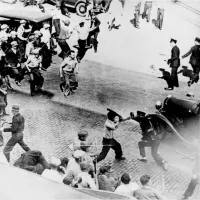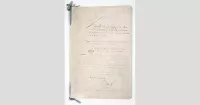A jury is a group of individuals sworn to hear evidence and deliver an impartial verdict in a court case. Petit juries, typically composed of up to 15 people, are used in trials to determine facts and render a verdict or set a penalty. Grand juries, consisting of 16 to 23 jurors, are employed to investigate potential crimes and issue indictments.
January 4, 1924: Emminger Reform abolishes jury system
On January 4, 1924, during an Article 48 state of emergency, the Emminger Reform abolished the jury system and replaced it with a mixed system that included bench trials and lay judges.
1925: Social Democrats call for reinstitution of the jury
In 1925, the Social Democrats called for the reinstitution of the jury; a special meeting of the German Bar demanded revocation of the decrees, but "on the whole the abolition of the jury caused little commotion". Their verdicts were widely perceived as unjust and inconsistent.
1936: Juries disbanded with the outbreak of the Spanish Civil War
In 1936, juries were again disbanded with the outbreak of the Spanish Civil War.
1937: Constitution of Ireland mandates trial by jury
In 1937, Article 38 of the Constitution of Ireland mandated trial by jury for criminal offences, with exceptions for minor offences, military tribunals, and cases where ordinary courts are inadequate.
1976: Juries Act 1976
In 1976, the Juries Act 1976 was enacted to regulate the selection, obligations, and conduct of juries.
1978: Constitution permits legislation allowing juries in criminal trials
In 1978, the Constitution permitted the Cortes Generales to pass legislation allowing juries in criminal trials.
1997: Mikel Otegi jury trial
In 1997, one of the first jury trial cases was that of Mikel Otegi who was tried for the murder of two police officers. After a confused trial, five jury members of a total of nine voted to acquit and the judge ordered the accused set free. This verdict shocked the nation.
2001: Adoption of the Criminal Procedure Code
In 2001, the Criminal Procedure Code was adopted, providing the right to a jury trial in criminal cases heard by regional and military courts, composed of 12 jurors.
2006: DPP v Nally case clarifies jury's right to acquit
In 2006, in the case of DPP v Nally, Kearns J set out that a jury has the right to reach a not guilty verdict even in direct contradiction of the evidence.
2008: Anti-state criminal cases removed from jurisdiction of the jury trial
In 2008, anti-state criminal cases (treason, espionage, armed rebellion, sabotage, mass riot, creating an illegal paramilitary group, forcible seizure of power, terrorism) were removed from the jurisdiction of the jury trial.
2008: Manchester Civil Justice Centre constructed
In 2008, at the new Manchester Civil Justice Centre, fewer than 10 of the 48 courtrooms had jury facilities. Jury trials are also available for some few areas of civil law (for example defamation cases and those involving police conduct); these also require 12 jurors (9 in the County Court). However less than 1% of civil trials involve juries.
2008: Amendment by the Civil Law (Miscellaneous Provisions) Act 2008
In 2008, the Juries Act 1976 was amended by the Civil Law (Miscellaneous Provisions) Act 2008.
June 2009: Ruling for trial without a jury
On 18 June 2009, the Lord Chief Justice, Lord Judge, sitting in the Court of Appeal, made English legal history by ruling that a criminal trial in the Crown Court could take place without a jury, under the provisions of the Criminal Justice Act 2003.
2010: Law Reform Commission examined jury service
In 2010, The Law Reform Commission examined jury service, producing a consultation paper.
2012: Reduction in Jury Size
In 2012, the number of jurors was reduced from nine or twelve to three professional judges alongside six jurors in first instance proceedings or nine in appeal proceedings. This change was implemented to cut spending.
November 2013: DPP requests a 15-member jury
In November 2013, the DPP requested a 15-member jury at the trial of three Anglo Irish Bank executives.
2016: Change of policy at the Courts Service
In 2016, there was a change of policy at the Courts Service regarding the enforcement of fines for failing to report for jury service.
June 2018: Defendants can claim a jury trial in criminal cases
From June 2018, defendants can claim a jury trial in criminal cases heard by district courts and garrison military courts. The jury is composed of 8 jurors in regional courts and military courts or 6 jurors in district courts and garrison military courts.
2018: Last jury case
In Norway, the last jury case was in 2018. After the European Court condideres that no-one should be sentenced without the considerations in the judgement, juries were abolished.
5/1995: Organic Law regulates crimes with mandatory trial by jury
On May 22, 1995, Organic Law 5/1995 regulated the categories of crimes in which a trial by jury is mandatory. For all other crimes, a single judge or a panel of judges will decide both on facts and the law. Spanish juries are composed of 9 citizens and a professional Judge.
Mentioned in this timeline

War is defined as an armed conflict involving the armed...

Justice in its broadest sense is the concept of treating...

A state of emergency grants governments extraordinary powers during crises...

A riot is a form of civil disorder involving a...

A constitution serves as the foundational legal document for any...

A bank is a financial intermediary that accepts deposits from...
Trending

21 minutes ago Cavaliers defeat Hornets 118-113: Game recap and key takeaways from the match.
21 minutes ago Vaccination Requirements and Measles Prevention in Cabo San Lucas and La Paz
21 minutes ago Cason Wallace Secures Four Steals in Thunder's Victory: A Promising NBA Performance.
1 day ago Roman Anthony expected as Red Sox leadoff hitter in 2026, lineup prediction

22 minutes ago Isaiah Hartenstein showcases passing skills, removed from injury report, fills stat sheet.
22 minutes ago Sadie Sink and Noah Jupe Star in Romeo & Juliet West End Production.
Popular

Jesse Jackson is an American civil rights activist politician and...

Barack Obama the th U S President - was the...

Bernie Sanders is a prominent American politician currently serving as...

Michael Joseph Jackson the King of Pop was a highly...

Ken Paxton is an American politician and lawyer serving as...
WWE Raw a professional wrestling television program by WWE airs...